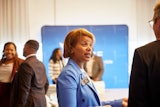In September Renata “Toni” Roy’s had one of her dreams become reality when a choir of 105 students representing dozens of the nation’s historically Black colleges and universities took the stage in front of a packed audience at the 2,500-seat John F. Kennedy Center concert hall in Washington, D.C.
Roy’s idea for the “105 Voices of History” concert began developing four years ago during her days as special assistant for private sector partnerships for the White House Initiative on Historically Black Colleges and Universities.
Roy, whose son and daughter are graduates of Dillard and Hampton universities, began to think about the role HBCU choirs traditionally have had in growing and promoting the institutions.
“Music is the legacy of our schools,” says Roy, who formed the choir and concert under her nonprofit, Partners Achieving Success. “That was the foundation. That’s what helped build buildings. When you needed money, you got the money from the choir. I really want to make sure that they still utilize that resource.”
Fisk University, founded in 1866, began to expand after its choral ensemble of students, the Fisk Jubilee Singers, went on tour to raise funds for the school. With money raised in 1873, the year the group first performed in Europe, Fisk built Jubilee Hall, the school’s first permanent building.
Roy brought together a group of 19 partners including Aetna, the National Endowment for the Arts, the BET Foundation and Macy’s to provide the funding and services needed for the show to go on.
“My goal was to give one student from every HBCU the opportunity to perform on America’s most renowned cultural stage because we have earned that right,” Roy says.
“I also wanted to re-educate America,” says Roy, who discovered many corporate executives aren’t aware of the number of HBCUs. “Now everyone knows that there are 105 HBCUs.”
Roy plans two concerts each school year, one in the fall at the start of the initiative’s HBCU week and a second in February during HBCU presidents week. Students from 65 schools make up this year’s choir. Each summer students will have the opportunity to compete to become one of the choir’s 105 voices.
The dozens of conference calls necessary to build the choir and concert program began a year ago when Roy met with Dr. J. Weldon Norris, director of university choral activities and professor of music at Howard University.
“I thought it was a wonderful idea, and a very complicated idea,” says Norris, who has taken Howard University’s choir to concert halls around the world. “We worked at it, and I worked with her because it would be a very big thing for the HBCU conductors to further them along.”
Norris, who served as one of the choir’s three national conductors, planned the number of altos, sopranos, tenors and bases needed to make up the choir and asked each school to send four students to one of the four regional training sites Roy organized. The regional conductors chose the voices and the choir began holding rehearsals in each region in May.
Norris, Dr. Carl W. Haywood, director of choral activities at Norfolk State University and Damon Dandridge, who holds the same title at Cheyney University at Pennsylvania, chose the concert pieces — a diverse selection of music from the choral classics, compositions by Black composers and gospel classics.
Four days before the start of HBCU Week, the 105 students arrived in Washington, D.C. for the final training sessions and solo selection. In addition to rehearsals, the students also participated in personal development workshops.
The end result was not just a concert, but the foundation for an institute to provide advanced training for students to develop the skills to compete for careers in the arts.
“This is a training institute. This is more than a choir,” says Roy, who is also raising scholarship money. “I want to give stipends to the conductors to pay for music materials, transportation for the students to attend regional training sessions and also provide the other resources to run the institute.”
“Everyone can not go to Italy or another fine arts school,” Roy says. “So having the national concert choir gives them the opportunity to have advanced training.”
Click Here to watch Video
Email the editor: [email protected]
Click here to post and read comments
© Copyright 2005 by DiverseEducation.com


















